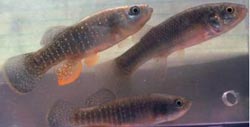Warmer oceans could raise mercury levels in fish

Dartmouth and other researchers studied killifish under varying temperatures in the lab and in salt marsh pools in Maine. Credit: NOAA<br>
Rising ocean surface temperatures caused by climate change could make fish accumulate more mercury, increasing the health risk to people who eat seafood, Dartmouth researchers and their colleagues report in a study in the journal PLOS ONE.
Until now, little has been known about how global warming may affect mercury bioaccumulation in marine life, and no previous study has demonstrated the effects using fish in both laboratory and field experiments. Mercury released into the air through industrial pollution can accumulate in streams and oceans and is turned into methylmercury in the water.
The researchers studied killifish under varying temperatures in the lab and in salt marsh pools in Maine. Fish in the marshes ate insects, worms and other natural food sources, while the lab fish were fed mercury-enriched food.
Results showed the fish in warmer waters ate more but grew less and had higher methylmercury levels in their tissues, suggesting increases in their metabolic rate caused the increased uptake of the toxic metal.
Broadcast studios: Dartmouth has TV and radio studios available for interviews. For more information, visit: http://www.dartmouth.edu/~opa/radio-tv-studios/
Media Contact
More Information:
http://www.dartmouth.eduAll latest news from the category: Ecology, The Environment and Conservation
This complex theme deals primarily with interactions between organisms and the environmental factors that impact them, but to a greater extent between individual inanimate environmental factors.
innovations-report offers informative reports and articles on topics such as climate protection, landscape conservation, ecological systems, wildlife and nature parks and ecosystem efficiency and balance.
Newest articles

“Nanostitches” enable lighter and tougher composite materials
In research that may lead to next-generation airplanes and spacecraft, MIT engineers used carbon nanotubes to prevent cracking in multilayered composites. To save on fuel and reduce aircraft emissions, engineers…

Trash to treasure
Researchers turn metal waste into catalyst for hydrogen. Scientists have found a way to transform metal waste into a highly efficient catalyst to make hydrogen from water, a discovery that…

Real-time detection of infectious disease viruses
… by searching for molecular fingerprinting. A research team consisting of Professor Kyoung-Duck Park and Taeyoung Moon and Huitae Joo, PhD candidates, from the Department of Physics at Pohang University…





















